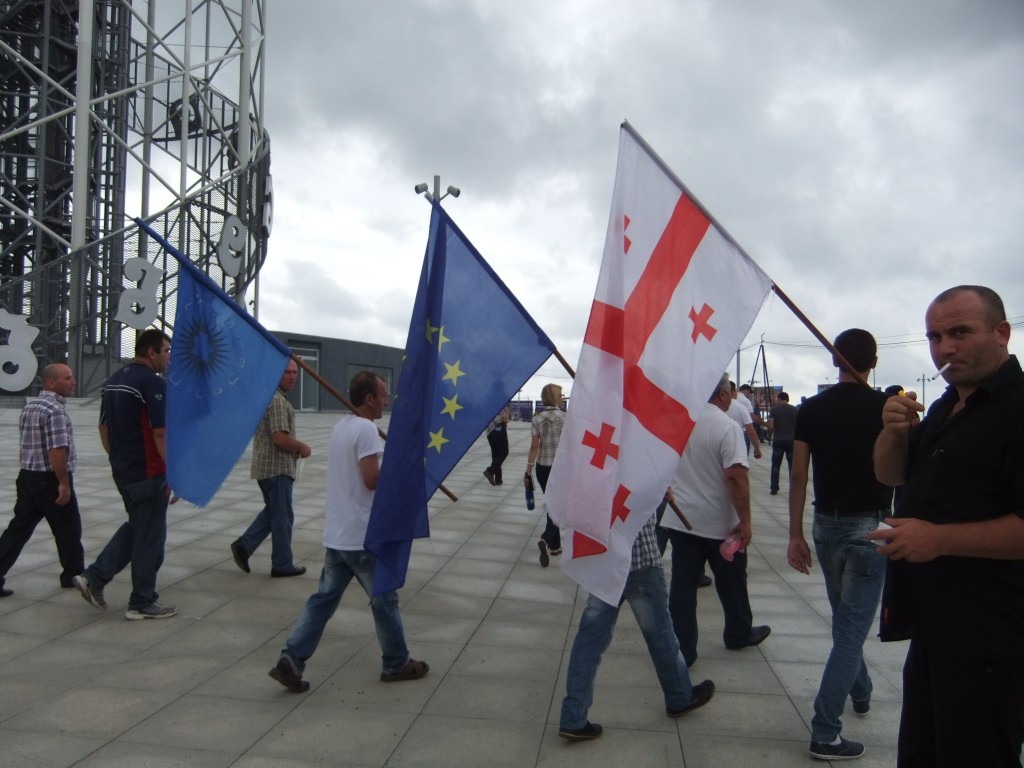The emigré vote
Georgia, like many post-Soviet states, is a country with an enduring history of emigration. Whilst the official population of Georgia is 4.5 million, some claim that some 25% of those holding Georgian citizenship are living abroad. When you consider the contested upcoming elections, that’s an important slice of the electorate. A very tasty slice.
The opposition party, Georgian Dream, has been actively campaigning amongst the Georgian diaspora since its leader Bizdina Ivanishvili – a self-made billionaire, Georgia’s richest man and the world’s 153rd – declared his intention to stand for the presidency a year ago. Georgians living abroad are keeping a close eye on the political developments in the homeland. Indeed these elections could mark a crucial turning point in Georgian politics; they are a test of the willingness of the ruling and opposition parties to bide by the democratic rules they so vigorously claim to uphold, and they may well mark the end of president Mikhael Saakashvili’s 8-year term in office. As the leader of the Rose Revolution which overthrew Shevarnadze (who was Gorbachev’s foreign minister and maintained Russian influence in post-Soviet Georgia), Saakashvili is a young, popular, Westward-looking president who by all accounts has instigated much positive reform, but his rival Ivanishvili blames him for failures in the justice system and the economy.
The majority of those émigré Georgians following the political debate with bated breath find themselves in a frustrating situation, however. Since they are largely undocumented in their country of residence, they will be unable to vote on polling day, October 1st. Ivanishvili has publicly decried this situation, blaming the Georgian government for failing to put in place measures to allow foreign-based Georgians to vote (of course, this failure could much more logically be put down to the refusal of most European countries to give foreigners legal status). So, in a heroic gesture of solidarity, Georgian Dream stage-managed an impressive homecoming this week at the Turkish-Georgian border. A few hundred Georgians from France, Germany, Greece, UK, Spain, USA and elsewhere crossed triumphantly into Georgia in several coaches on 17th and 18th September. When the émigrés emerged to shake hands with the journalists and Georgian Dream representatives gathered at the checkpoint, each of them was holding a TV satellite. They were bringing them back for their families, they explained, so that they could access worldwide media and not only the Georgian channels, which some claim to have a pro-government biais.
I was in the park in Tbilisi where a stage was erected so Ivanishvili could personally welcome the émigrés back home, accompanied by singers crooning “Kartuli osnebaaaa…” (“Georgian Dream”) . Some old men I talked to told me that Ivanishvili is a good man; he wants to help people, to help his country. I asked if he’d financially helped these people to come back home. No, no, they ensured me, they paid the journey themselves. Strange, then, that they should all arrive in the same bus, with the same brand of satellite dish in their hand. Strange, too, that economic migrants, who face great difficulties obtaining a visa to get into their host country, should risk their chances of returning in order to place their vote. Since I haven’t been able to talk to any of the people who arrived on the bus, these mysteries remain. It isn’t clear whether and how much Georgian Dream paid the émigrés – what’s sure is the opposition party had a part to play in their carefully-orchestrated return, and used it as a well-timed publicity stunt in the crucial pre-election period. Also, as I look at the EU flags being proudly waved by both the ruling and opposition parties, it seems to me they have both missed the point. If the large section of the Georgian population living abroad is having difficulties exercising their civic duties, it is not the fault of the Georgian government, nor of the migrants themselves, but of their host countries which refuse to accord them official residency.
The ruling-party is capable of such puerile sensationalism too – as the recent controversy over videos of police violence against prison inmates goes to prove. Following the release of the videos showing beatings and rape of prisoners, the Saakashvili government immediately blamed an Ivanishvili plant in the prison in question for bribing police to make the videos to discredit the government. This seems too much like childish finger-pointing to be believable to me. As the temperature rises on the approach to election day, both sides are attempting to tap into voters’ emotions, creating potent symbols of some of the major issues the country faces; mass emigration and a swollen, maltreated prison population.
for more information see articles on the émigré’s return
















